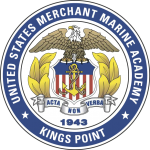News
Preparing for the Next War in the Pacific
This timely article addresses the current severe shortage of fuel tankers, which will be critical to keep the U.S. Navy afloat in any potential war with China. The author, Captain Steve Carmel, points out the difference between “assured access” and “assumed access” and how depending on foreign flagged tankers in a conflict could be disastrous.
“Assured access” means we’re using U.S. flagged vessels owned by American companies and manned by US citizens. Anything less – “assumed access” – puts our national defense at risk.
Capt. Carmel writes that the sheer complexity of operating these tankers demands that any officers serving upon them are required to have advanced training and additional credentials.
As part of a Midshipman’s education at the U.S. Merchant Marine Academy, they engage in the unrivaled training known as Sea Year, where Midshipmen spend a year on the decks and in the engine rooms of the commercial ships, including tankers, that the U.S. government relies on in times of conflict.
USMMA’s Sea Year provides the only assured opportunity for Midshipmen to obtain the USCG-mandated training aboard oil tankers, and it is these USMMA Midshipmen who make up the largest – by far – cadre of highly trained Merchant Marine officers necessary for executing the National Military Strategy.
USMMA graduates play a vital role in maintaining the maritime strength and security of the nation, making up more than 80% of the U.S. Navy Strategic Sealift Officer force.
Every single one of our graduates are obligated to serve the nation for eight years, and every graduate earns an unlimited Merchant Marine officer’s license as a Third Mate or Third Assistant Engineer. They stand ready, willing – and as a result of their training aboard commercial vessels – able to serve the moment they graduate.
